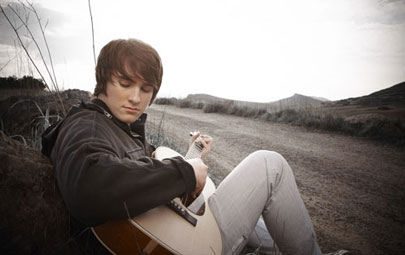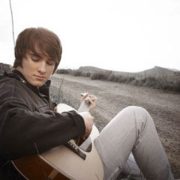Chase Coy
SINGER SONGWRITER'S DEBUT ALBUM
BRINGS DOWN THE MOON
 In his 19 years on the planet, Midwestern, singer-songwriter, Chase Coy has accomplished much. While it has become difficult in the music industry for original songwriters to break in, the Internet and home studios have allowed artists like Chase to emerge with a spontaneous creativity. Without hooks or clever arrangements and overly adorned production, Chase has released a debut album, Picturesque, of personal, intimate yet universal love songs. He draws from the well of his musical inheritance; the likes of James Taylor, Paul Simon, Joni Mitchell, Jackson Browne and Josh Ritter. At the center is his voice, a mesmerizing acoustic guitar and the melodic lyrics which fall effortlessly from his own personal universe. The popular, If the Moon Fell Down, is an example of the careful balance he walks between pop and folk, the personal and the universal.
In his 19 years on the planet, Midwestern, singer-songwriter, Chase Coy has accomplished much. While it has become difficult in the music industry for original songwriters to break in, the Internet and home studios have allowed artists like Chase to emerge with a spontaneous creativity. Without hooks or clever arrangements and overly adorned production, Chase has released a debut album, Picturesque, of personal, intimate yet universal love songs. He draws from the well of his musical inheritance; the likes of James Taylor, Paul Simon, Joni Mitchell, Jackson Browne and Josh Ritter. At the center is his voice, a mesmerizing acoustic guitar and the melodic lyrics which fall effortlessly from his own personal universe. The popular, If the Moon Fell Down, is an example of the careful balance he walks between pop and folk, the personal and the universal.
While other teen artists experiencing musical success are lost in the American Idol image machine and the quest for fame, Chase’s words reaffirms the everyday experience and ordinary times expressed with simplicity and clarity. His is a young voice, but the path he travels is as old as time.
His first full length album, Picturesque, takes us through the caverns of his young heart. In the following interview he described his songs as abstract and impressionistic. There is an easy-to-hear feel in these songs. The album is reflective, romantic and introspective without being indulgent. These songs are from the breath a young singer-songwriter similar to that of James Taylor’s Sweet Baby James song cycle 40 years ago or the first time Jackson Browne put These Days down to pen and paper.
The most encouraging thing about encountering this talented young singer-songwriter is the sense of continuity with the past music of the troubadours. Reflected in these songs is reminder that music is immortal and drawn from some unknown place in our soul. Chase Coy has tapped into this. I must admit sometimes I have feared this has been lost on more recent generations in the blur of commercialized, overproduced iPod downloads. This artist is living proof acoustic music will continue to live. As the following interview suggests his artistry and craftsmanship has just begun to develop.
TERRY: You’re so young. What has inspired you to write songs?
CHASE: I don’t know. I started doing it and then just got used to it. I didn’t think about it too much. It started just for fun. I started in middle school and as I grew up it became more serious.
TERRY: What are your main themes?
CHASE: I write a lot about relationships. It’s personal , but it’s the kind of thing anyone can related to.
TERRY: These are based on your own experiences?
CHASE: Yes. I’m not really a storyteller though. I write based on my own experience. It’s grounded in reality. If I were a painter, I’d be an impressionist. I try to do snapshots in time, not really concrete. It seems like that opens the lyrics. And it’s not something I think about too much. You know, it’s not chronological. I’m trying to capture these moments.
TERRY: Carrie Newcomer has said, ‘we don’t really remember days as much as we remember moments.’
CHASE: That’s exactly right. That’s what I’m trying to do.
TERRY: Where does this come from?
CHASE: How do I say this? For me, I don’t think analytically. If I do that it goes away; if there’s too much thought. It’s not cerebral. The beauty of music is that it gets past thinking. I hope my songs evoke emotions, feelings. You know, when I write a song, I don’t really have to ask why. I just let it happen. It has a life of its own.
TERRY: What music do you listen to?
CHASE: All sorts of stuff. But the music which has really inspired me is contemporary songwriters John Forman. Lately I’ve been listening to the older music like James Taylor and Elliot Smith.
TERRY: Do you feel pressure to make ‘commercial music?’
CHASE: At the end of the day, what is commercial? You know a lot of singer-songwriter music is pop. I try to make good music and not worry too much about the rest. The beauty of the radio and Internet is, aside the business, which can be terrible, the music that comes from the people can be heard. And you know, the music industry is a slave to the consumer. People want to hear honest music. If people want it, it’s commercial. It’s about making music that people love.
TERRY: It’s seems like you represent a backlash among young people from the punk/metal/rap and pop scenes toward simple acoustic melody and lyric.
CHASE: Yes….well there are bands and acts that just kind of churn stuff out that may be good, but it’s like coming out of machine. You know, overproduced. But, through the Internet, I’m able to put out something now that is meaningful and real. I listen to bands that no one has heard of because of the Internet. That’s how kids find good music, not really through the music industry.
TERRY: Are you a folksinger?
CHASE: In a way. I would consider myself to have components of folk music and pop. I’m not the storyteller, the more traditional kind. It’s also pop music with a different format. You know, I try toward songs with catchy melodies. Sometimes folk music has done this with words and melodies. But, then, it’s considered pop if it has media appeal. The trick is writing a song that people don’t have to listen too closely to…It just hangs on a melody that will stay with you. I don’t want it to be too weird. I’d like my music to be immediately accessible. At the end of the day, that’s what I hope this new CD is for people.
TERRY: What about acoustic music as opposed to electric?
CHASE: It’s interesting that acoustic music has become considered to be its own genre. When I play unplugged without microphones or electric guitar, I’m much closer to the listener. Like I’m in your living room. You know the Jonas Brothers can play to audiences of 50,000, but there’s that barrier between of electricity and show. I hope people can listen to me without that distance. I want closeness.
TERRY: Does it make you more vulnerable?
CHASE: Yes. There’s distance inherent in electric guitar. Mentally, it feels like you’re farther away. It’s not really being more honest. Yes. That it make you more vulnerable is true. There’s nothing between you and that person you’re playing for.
TERRY: You’ve had as much 40,000 downloads on iTunes. Is this from regional or national success?
CHASE: Definitely national. We sometimes draw bigger crowds in Texas or Illinois than we do in Indiana.
TERRY: What’s in the future for you?
CHASE: Right now I’ll tour behind the album in June. I’ll be producing. I self-produced this new CD. I’ll continue writing, of course.
Chase Coy will be appearing on Sunday, June 20 at The Roxy in Hollywood.
Terry Roland is an English teacher, freelance writer, occasional poet, songwriter and folk and country enthusiast. The music has been in his blood since being raised in Texas. He came to California where he was taught to say ‘dude’ at an early age.
Chase Coy
SINGER SONGWRITER'S DEBUT ALBUM
BRINGS DOWN THE MOON













